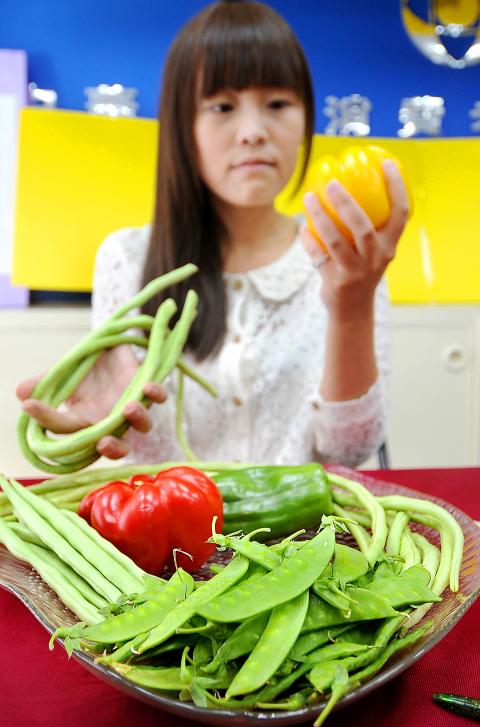The Consumers’ Foundation yesterday said its latest random testing of vegetables for pesticides found that 91 percent of cowpeas, 67 percent of snow peas, 47 percent of string beans and 18 percent of sweet peppers bought in the Greater Taipei area contained excessive amounts of pesticide residues or pesticides that are not allowed.
The survey was conducted in April and May on 49 samples —11 cowpeas, 12 snow peas, 15 string beans and 11 sweet peppers — bought at hypermarkets, supermarkets, traditional markets and organic food stores, the foundation said.
Chen Chih-yi (陳智義), publisher of the foundation’s Consumer Reports Magazine, said 27 samples had pesticide residue exceeding the levels regulated by the Standards for Pesticide Residue Limits in Foods (殘留農藥安全容許量標準) or had banned pesticide on them.

Photo: Fang Pin-chao, Taipei Times
A few samples had as many as eight types of pesticides on them, Chen said.
Ten of the 11 cowpea samples violated regulations, the foundation said. One cowpea sample found with eight types of pesticide carried traces of chlorantraniliprole — which is not allowed to be used on the vegetable — and four other pesticides that exceeded regulated limits, including fenpropimorph residue that was up to 90 times the limit, the foundation said.
Another cowpea sample had four types of pesticide and oxycarboxin residue more than 200 times the regulated limit, the foundation said, adding that it was common for farmers to use several types of pesticides on cowpeas at once.
Cheng Cheng-yung (鄭正勇), member of the foundation’s food commission and a professor of horticulture at National Taiwan University, said because vegetables are often harvested in batches instead of being picked all at one time, various pesticides can accumulate on the plants over time. The used of mixed pesticides could affect consumers’ livers and damage their health, Cheng said.
Buying from organic stores is no guarantee of purity.
The survey said a sweet pepper purchased from an organic food store had six types of pesticides, including one type banned from use on sweet peppers and one type that exceeded the regulated amount.
The foundation said consumers can reduce their pesticide intake by not buying fruit and vegetables based just on their good appearance, buying vegetables in bags, soaking vegetables in water for at least 15 to 20 minutes before cooking, not putting lids on pots when cooking vegetables so pesticide residues can evaporate and not consuming the sauce or water left in a dish of cooked vegetables.
The Council of Agriculture said it would increase inspections on such vegetables and fine farmers who violate the Agro-pesticide Act (農藥管理法) more than NT15,000. It said it would also assist local agencies to establish agricultural product safety self-management mechanisms.
The council said it would hold at least 100 workshops in major vegetable production areas to instruct farms on appropriate pesticide usage, adding that farmers who do not attend the workshops would be a priority in future pesticide inspections.

The Ministry of Economic Affairs has fined Taobao NT$1.2 million (US$36,912) for advertisements that exceed its approved business scope, requiring the Chinese e-commerce platform to make corrections in the first half of this year or its license may be revoked. Lawmakers have called for stricter enforcement of Chinese e-commerce platforms and measures to prevent China from laundering its goods through Taiwan in response to US President Donald Trump’s heavy tariffs on China. The Legislative Yuan’s Finance Committee met today to discuss policies to prevent China from dumping goods in Taiwan, inviting government agencies to report. Democratic Progressive Party Legislator Kuo Kuo-wen (郭國文) said

The Ministry of Economic Affairs has fined Taobao NT$1.2 million (US$36,900) for advertisements that exceeded its approved business scope and ordered the Chinese e-commerce platform to make corrections in the first half of this year or its license would be revoked. Lawmakers have called for stricter supervision of Chinese e-commerce platforms and more stringent measures to prevent China from laundering its goods through Taiwan as US President Donald Trump’s administration cracks down on origin laundering. The legislature’s Finance Committee yesterday met to discuss policies to prevent China from dumping goods in Taiwan, inviting government agencies to report on the matter. Democratic Progressive Party

Taiwan and its Pacific ally Tuvalu on Tuesday signed two accords aimed at facilitating bilateral cooperation on labor affairs, according to Taiwan’s Ministry of Foreign Affairs (MOFA). The governments inked two agreements in Taipei, witnessed by Foreign Minister Lin Chia-lung (林佳龍) and visiting Deputy Tuvaluan Prime Minister Panapasi Nelesone, MOFA said in a news release. According to MOFA, the agreements will facilitate cooperation on labor issues and allow the two sides to mutually recognize seafarers’ certificates and related training. Taiwan would also continue to collaborate with Tuvalu across various fields to promote economic prosperity as well as the well-being of their

Sung Chien-liang (宋建樑), who led efforts to recall Democratic Progressive Party (DPP) Legislator Lee Kun-cheng (李坤城), was released on bail of NT$80,000 today amid outcry over his decision to wear a Nazi armband to questioning the night before. Sung arrived at the New Taipei District Prosecutors’ Office for questioning in a recall petition forgery case last night wearing a red armband bearing a swastika, carrying a copy of Adolf Hitler’s Mein Kampf and giving a Nazi salute. Sung left the building at 1:15am without the armband and covering the book with his coat. Lee said today that this is a serious